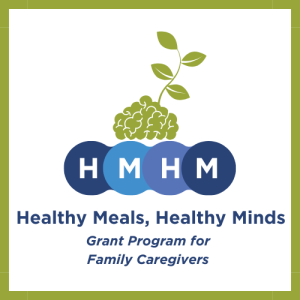Applicants can reapply for the HMHM Grant Program every 60 days / 2 months

The Healthy Meals, Healthy Minds Grant Program supports family caregivers by funding $250 for services promoting mental health, wellness, and nutritious meals through meal kits. This program’s objective aligns with Goal #3 of the 2022 National Strategy to Support Family Caregivers: Strengthen Services and Supports. Specifically, it advances the Strategy by promoting:
Education, counseling, and peer support
Access to nutritious meals for caregivers
Eligibility Criteria
To qualify for the grant, the primary or family caregiver must have a professional (such as an ADRC staff member, Tribal ADRS, or county case manager) complete the Supporting Documentation Form. This form must show that the care recipient meets one of the following conditions:
- Applied for a Long-Term Care Waiver or similar program but will not receive services or approval within 30 days.
- Denied Long-Term Care Waiver support or other respite programs.
- Approved for a Long-Term Care Waiver or respite program but has already used all available funds.
- Receiving other support but needs flexibility for services that current funding does not cover.
Did not apply for a Long-Term Care Waiver because they are not eligible for other supports.
Long-Term Care Waiver & Other Caregiver Supports
Check your eligibility with these programs before applying for the CRGP.
- Children’s Long-Term Care Support (CLTS) (ages birth – 21)
- Children’s Community Options Program (CCOP) (ages birth – 21)
- Care4Kids (ages birth – 21)
- Children with Medical Complexity: Hospitals in Madison, Marshfield, and Milwaukee (ages birth – 26 years old. There are a couple of policy caveats for 21- to 26-year-olds, but they are eligible until then).
- Katie Beckett Medicaid (ages birth – 18)
- Kinship Care (ages birth – 17* limited circumstances may extend up to 21- See Wis. Ch. DCF 58)
- Foster Care Support Services (ages birth – 17* limited circumstances may extend up to 21- See Wis. Ch. 48)
- Family Care (Managed Care Organizations) (age 18+)
- Include Respect I Self-direct (IRIS) (age 18+)
- Independent Living Supports Pilot (age 18+)
- National Family Caregiver Support Program (NFCSP) (Care recipient is age 60 or older – or has Alzheimer’s or other dementia, any age, or Grandparents and relatives age 55+ who are primary caregivers for children younger than age 18.)
- Alzheimer’s Family Caregiver Support Program (AFCSP) (Diagnosis of probable irreversible dementia: Alzheimer’s, vascular dementia, Lewy body dementia, Parkinson’s, and other diseases that include dementia, irreversible MCI, etc.)
- Veteran Services (Veteran or applicant deriving benefits from a Veteran – See Wis. Stat Section 45.02)
Respite Resources
For primary caregivers of children, use this Wisconsin County Contact List to locate and contact your county representative for the CLTS Waiver Program or CCOP services.
For primary caregivers of adults or older adults, use this Wisconsin Aging & Disability Resource Center (ADRC) List to locate and contact your ADRC for the above LTC programs.
Native American Tribal members can contact a Tribal aging and disability resource specialist (ADRS) by visiting the ADRC: Find Your Tribal ADRS.
Instructions on How to Apply
HMHM Overview, Policy, and Procedure Form
This four-page document explains the eligibility requirements, application procedures, additional resources, and program terms and conditions.
The HMHM Eligibility Criteria Form can be found HERE
The link to the Supporting Documentation Form can be found HERE
Once RCAW has notified the applicant (via email) that the ECF & SDF have been received, they will receive a link to the HMHM application.
Applicants need to track expenses using the Grant Report. RCAW will email a link to this form to approved applicants.
Appeals: RCAW’s board of directors will review SRGP applicants’ disputes if they have been denied a grant application and provide resolution requirements for RCAW. Anyone who wishes to file an appeal must use the Grant Denial Appeal Form.
Grant Program Fraud Statement RCAW funds the majority of its programs with state and federal funds. RCAW is responsible for ensuring funds are used for their intended purpose and in a manner to conduct the goals and objectives identified in the grant. RCAW reserves the right to deny a grant application if it suspects or detects fraudulent information contained on a grant application RCAW also reserves the right to report suspected fraud to the appropriate officials, and applicants will be banned from applying for grants in the future. They may be subject to repayment of said grant funds to RCAW. All parties involved in grant fraud can potentially be charged with government grant fraud. Using state and federal grant dollars for unjust enrichment, personal gain, or other than their intended use is a form of theft, subject to criminal prosecution. Read the Grant Program Detailed Fraud Disclaimer.
Questions?
If you have questions about eligibility or other resources, please get in touch with RCAW at [email protected]
This project is supported by the Administration for Community Living (ACL), U.S. Department of Health and Human Services (HHS) as part of a financial assistance award totaling $490,000 with 75 percentage funded by ACL/HHS and $142,933 and 25 percentage funded by non-government source(s). The contents are those of the author(s) and do not necessarily represent the official views of, nor an endorsement, by ACL/HHS, or the U.S. Government.